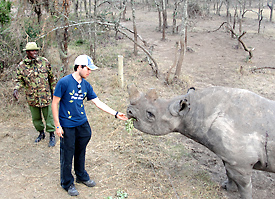
U-M undergraduate students with a passion for sustainability now have a challenging, new avenue for focusing their studies on this subject: the Undergraduate Sustainability Scholars Program.
Launched this year by the Graham Environmental Sustainability Institute, this competitive certificate program annually accepts 25 high-performing second-year students, who then pursue a 10-credit series of sustainability-focused courses and activities.
Program in the Environment (PitE) and International Studies double-major Collette Rothe is one such student. Last month she returned from Kenya, where she participated in an intensive, three-week field course called “Sustainability Challenges and Opportunities in East Africa” (with funding from the Graham Institute to help participants fulfill the place-based course requirement of the Sustainability Scholars Program).
“This course gave me an unparalleled opportunity to study and perform research in the field, to contribute to real-world sustainability initiatives, and to directly aid in the conservation of biodiversity in the developing world,” she says about the class, which took place at the 48,000-acre Mpala Research Center and Wildlife Refuge in Kenya’s Laikipia Region. “It really was an educationally rich, life changing experience.”
According to Graham Institute Education Director Mike Shriberg, such place-based coursework is a valuable complement to other requirements of the Sustainability Scholars Program, which is designed to help students explore the natural, social, economic, political and technological aspects of sustainability.

U-M student Gerardo Villarreal feeds a Northern Black Rhino while in Kenya as part of the Undergraduate Sustainability Scholars Program. Photo courtesy Gerardo Villarreal.
“Students join together for an interdisciplinary cohort-building seminar, explore campus sustainability issues through the project-focused Campus and the Sustainability class, investigate personal interest areas through elective offerings, and learn about the world from different perspectives through place-based courses,” Shriberg says. “It really is designed to be a multi-disciplinary, action-oriented program that develops future sustainability leaders.”
Avery Robinson, PitE and Near Eastern Studies, comments about his experience in the Mpala course.
“It is one thing to go to Wikipedia and see that there are only eight Northern White Rhinos left in the world,” he says. “It is entirely different to see four of these majestic animals, understanding that the calf will possibly be the last living representative of this once plentiful species.”
For more information go to www.graham.umich.edu/education/undergrad-scholars.php.
Students in the Undergraduate Sustainability Scholars Program share what this new program means to them.
“The (program) is a perfect fit for me because it is giving me the opportunity to study the science, economics and social aspects behind good environmental policies.” — Candice Ammori, Gerald R. Ford School of Public Policy
“The multifaceted makeup of coursework will allow me to better understand every dimension of sustainability — ranging from a local perspective on campus to an international systems thinking approach that spans the globe.” — Alexa Eisenberg, Program in the Environment (PitE) and communication studies
“Through the Sustainability Scholars Program, I’ll be able to learn first-hand about real-life sustainability issues outside of the United States, which directly links to my goals of working in a developing country in the future. The value of this hands-on experience will be immeasurable.” — Olivia Kramer, PitE

